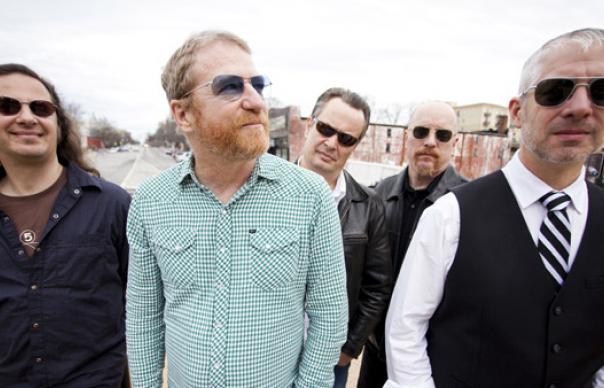CVB comeback, take two: A sun-cracked roots-rock homage to Northern California... When Camper Van Beethoven oozed out of California's post-punk scene circa mid-1980s, they confronted witnesses with a set of confounding contradictions: a novelty band, ostensibly—”Take the Skinheads Bowling” was the hit—counter-intuitively sporting a stunning breadth of musical range and ability; a fiercely DIY aggregation, yet explicitly cosmopolitan, conversant with everything from Balkan balladry to Jamaican ska; a hard-rock behemoth, yet leaning more on violin than electric guitar as lead instrument. They could play almost anything, convincingly and entertainingly, and their souped-up electric blender of country, punk, bluegrass, psychedelia, folk and folk-rock, prog, Middle-Eastern, Indian, and world music—steered by multi-instrumentalist Jonathan Segal—made for a combustible, funny, ever-unpredictable mix (think David Lindley's '60s group, Kaleidoscope). They eventually nudged the pop charts (covering Status Quo's “Pictures Of Matchstick Men”), recorded five LPs (two for major label Virgin), and ended up mired in a messy breakup that spawned myriad spin-offs: Monks of Doom, Jack & Jill, Camper Van Chadbourne, and, most notably, Cracker, singer David Lowery's straightforward-by-comparison rock juggernaut. But a rally around Fleetwood Mac's Tusk in 2002 produced a surprise reunion, followed by a strong, war-riddled comeback, New Roman Times. La Costa Perdida (tr. The Lost Thing) brings them full circle, plugging them back into their misfit Californian roots. “A California geographically lost,” explains singer/songwriter David Lowery. “A California lost in time . . . culturally forgotten. That's mostly what the album is about.” “Jonathan and I had started re-listening to Holland. In particular the track ‘Steamboat,’” explains Lowery. “Holland is the Beach Boys' Northern California record. This part of the Beach Boys' oeuvre has long been a big part of the CVB listening library.” Staking out their surreal, existential turf in typically atypical fashion—a kitchen-sink mix of country, blues, norteno, psych, and, yes, ‘60s-style pop harmonies—it's both a melancholy musing on place, especially “Come Down the Coast” and “Northern California Girls,” and shot through with mysticism, history, and spiritual restlessness. “Someday Our Love Will Sell Us Out,” with its mellifluous drone and robot-like harmony chorus, sounds like a dark, long-lost 1967 hippie 45. “Summer Days,” all spiraling riffs, an elegiac meditation on freedom/slavery, is the record's centerpiece. Luke Torn
CVB comeback, take two: A sun-cracked roots-rock homage to Northern California…
When Camper Van Beethoven oozed out of California’s post-punk scene circa mid-1980s, they confronted witnesses with a set of confounding contradictions: a novelty band, ostensibly—”Take the Skinheads Bowling” was the hit—counter-intuitively sporting a stunning breadth of musical range and ability; a fiercely DIY aggregation, yet explicitly cosmopolitan, conversant with everything from Balkan balladry to Jamaican ska; a hard-rock behemoth, yet leaning more on violin than electric guitar as lead instrument.
They could play almost anything, convincingly and entertainingly, and their souped-up electric blender of country, punk, bluegrass, psychedelia, folk and folk-rock, prog, Middle-Eastern, Indian, and world music—steered by multi-instrumentalist Jonathan Segal—made for a combustible, funny, ever-unpredictable mix (think David Lindley’s ’60s group, Kaleidoscope).
They eventually nudged the pop charts (covering Status Quo‘s “Pictures Of Matchstick Men”), recorded five LPs (two for major label Virgin), and ended up mired in a messy breakup that spawned myriad spin-offs: Monks of Doom, Jack & Jill, Camper Van Chadbourne, and, most notably, Cracker, singer David Lowery’s straightforward-by-comparison rock juggernaut.
But a rally around Fleetwood Mac‘s Tusk in 2002 produced a surprise reunion, followed by a strong, war-riddled comeback, New Roman Times. La Costa Perdida (tr. The Lost Thing) brings them full circle, plugging them back into their misfit Californian roots. “A California geographically lost,” explains singer/songwriter David Lowery. “A California lost in time . . . culturally forgotten. That’s mostly what the album is about.”
“Jonathan and I had started re-listening to Holland. In particular the track ‘Steamboat,’” explains Lowery. “Holland is the Beach Boys’ Northern California record. This part of the Beach Boys’ oeuvre has long been a big part of the CVB listening library.”
Staking out their surreal, existential turf in typically atypical fashion—a kitchen-sink mix of country, blues, norteno, psych, and, yes, ‘60s-style pop harmonies—it’s both a melancholy musing on place, especially “Come Down the Coast” and “Northern California Girls,” and shot through with mysticism, history, and spiritual restlessness. “Someday Our Love Will Sell Us Out,” with its mellifluous drone and robot-like harmony chorus, sounds like a dark, long-lost 1967 hippie 45. “Summer Days,” all spiraling riffs, an elegiac meditation on freedom/slavery, is the record’s centerpiece.
Luke Torn



